牛津译林版高中英语选修六goodproject
牛津译林版高中英语选修六Unit1LaughterisgoodforyouProject教学设计
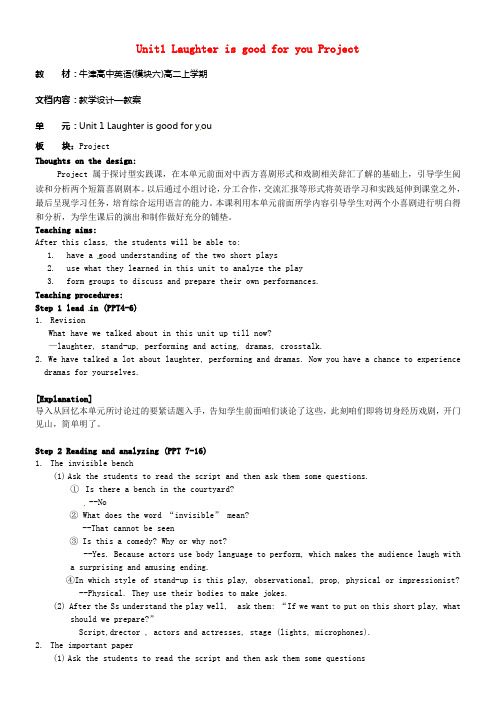
Unit1 Laughter is good for you Project教材:牛津高中英语(模块六)高二上学期文档内容:教学设计—教案单元:Unit 1 Laughter is good for y ou板块:ProjectThoughts on the design:Project属于探讨型实践课,在本单元前面对中西方喜剧形式和戏剧相关辞汇了解的基础上,引导学生阅读和分析两个短篇喜剧剧本。
以后通过小组讨论,分工合作,交流汇报等形式将英语学习和实践延伸到课堂之外,最后呈现学习任务,培育综合运用语言的能力。
本课利用本单元前面所学内容引导学生对两个小喜剧进行明白得和分析,为学生课后的演出和制作做好充分的铺垫。
Teaching aims:After this class, the students will be able to:1.have a good understanding of the two short playse what they learned in this unit to analyze the play3.form groups to discuss and prepare their own performances.Teaching procedures:Step 1 lead in (PPT4-6)1.RevisionWhat have we talked about in this unit up till now?—laughter, stand-up, performing and acting, dramas, crosstalk.2. We have talked a lot about laughter, performing and dramas. Now you have a chance to experience dramas for yourselves.[Explanation]导入从回忆本单元所讨论过的要紧话题入手,告知学生前面咱们谈论了这些,此刻咱们即将切身经历戏剧,开门见山,简单明了。
译林版高中英语选修六 Unit 1 Laughter is good for you-Project学案

Period Four ProjectⅠ.重点单词1.setting n.(戏剧、小说等的)情节背景;场景;环境set v t.布置,安排2.invitation n.邀请invite v t.邀请3.crowded adj.拥挤的crowd n.人群;v.拥挤4.officiallooking adj.貌似官方的goodlooking adj.长相好的5.anger n.怒气,怒,怒火angry adj.生气的angrily ad v.生气地6.bow v i.& v t.鞠躬;低头;(使)弯曲;n.鞠躬;船头7.tear v t.撕,扯;n.眼泪8.burst v i.猛冲;突然出现;爆裂9.emptyhanded adj.空手;一无所获10.glare v i.怒目而视;发出炫目的光Ⅱ.重点短语1.make room for为……腾出地方2.go on发生;进行;继续3.join sb.(in doing sth.)加入某人(一起做某事)4.dash out 冲出去5.at once 立刻6.burst in闯进;突然闯入7.present sth.to sb.将某物呈献给某人;颁发某物给某人8.glare at对……怒目而视9.hold out递出;拿出;伸出10.as fast as possible/one can 尽可能快地Ⅲ.重点句式1.as if引导的条件状语从句中的省略Of course.(moves over as if to make room for Tony)当然。
(挪了挪,好像是要为托尼腾出地方)2.must have doneNo.I must have forgotten to tell you.对。
我一定是忘记告诉你们了。
Ⅰ.课文阅读理解1.How many characters are in the play The in v isible bench?A.One. B.Two.C.Four. D.Five.答案D2.In the play The in v isible bench,who enters last?A.Mike. B.Ann.C.Cathy. D.Paula.答案B3.In the play The in v isible bench,who “moved the bench”?A.Mike. B.Ann.C.Paula. D.Cathy.答案A4.In the play The important papers,what on earth does the King want?A.A newspaper. B.A magazine.C.A roll of toilet paper. D.A dictionary.答案C5.In the play The important papers,the servant can call the King “”.A.Your Majesty B.Your HighnessC.Darling D.Both A and B答案DⅡ.课文阅读填空Play The in v isible bench The important papersThe 1.type/kind of the comedies Physical:Actors use their bodies toperform the play.Prop:Actors use props—toiletpaper and some other papers toperform the play.2.Characters Five studentsThe King,the Queen,the3.ServantSetting A park The palacePlotSome students 4.pretend to be sittingon an invisible bench and 5.enjoythemselves quite a lot.One of themmoves the bench without beingnoticed,so the others all fall downwhen the 6.truth/fact is told.The King wants some toiletpaper,7.but/while he says thathe wants importantpapers.Because he is theKing,the servant8.mistakes/takes theimportant papers for someofficial documents.Finally,theservant understands him and9.brings him what he wants.Funny pointSince the bench can not be 10.seen,nobody knows whether it is thereunless someone speaks it out.A play in which such words areused:important papers and toiletpaper.Ⅲ.课文阅读简答1.What kind of plays are they? Comedy or tragedy?Both of them are comedy.2.In the second play,why were the others unable to understand the King?Because the King expressed his opinion in a roundabout(拐弯抹角的) way and he said that he wanted his important papers;the others would mistake them for some official documents.重点词汇1.tears the paper in two把报纸撕成两半[归纳拓展]tear v.撕裂,撕碎;n.眼泪tear...in two把……撕成两半tear...into pieces把……撕碎tear at sth.撕扯某物(强调动作)tear down拆除[语境助记](1)She tore at the cloth but couldn’t tear it.她撕这块布,但没有撕开。
高二英语译林版选修6教案:Unit3(project)含解析
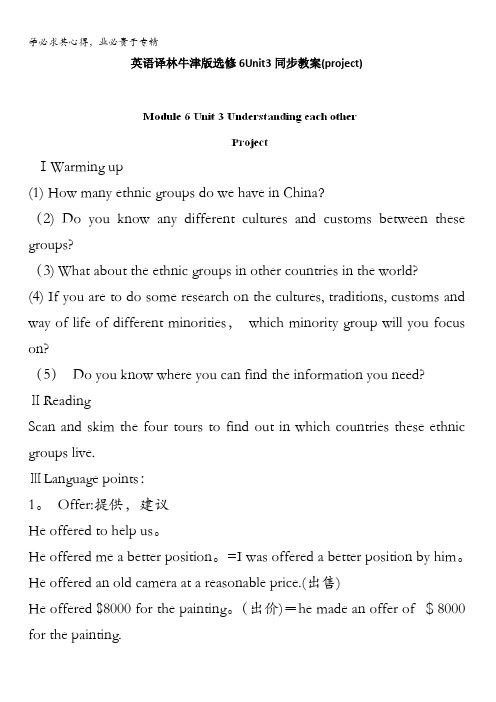
英语译林牛津版选修6Unit3同步教案(project)ⅠWarming up(1) How many ethnic groups do we have in China?(2) Do you know any different cultures and customs between these groups?(3) What about the ethnic groups in other countries in the world?(4) If you are to do some research on the cultures, traditions, customs and way of life of different minorities,which minority group will you focus on?(5)Do you know where you can find the information you need?ⅡReadingScan and skim the four tours to find out in which countries these ethnic groups live.ⅢLanguage points:1。
Offer:提供,建议He offered to help us。
He offered me a better position。
=I was offered a better position by him。
He offered an old camera at a reasonable price.(出售)He offered $8000 for the painting。
(出价)=he made an offer of $8000 for the painting.2. minority:Only a minority of students receive(s)the scholarship。
译林牛津版选修6:Unit+3+Understanding+Project(共19张)

Fast-Reading
1.Where is this passage most probably taken from? 2.What minority groups does this passage talk about? 3.In which countries do these minority groups live?
2.What are the main topics in Tour 2? A.Belief, living and hunting. B.Belief, customs and food. C.Customs, festivals and belief. D.Food, art, hunting and tools.
•Choose the topics and improve
the reference
•Distribute
the
•Collect task
information
page
•Choose a minority group
•Add pictures
Mysterious Gaoshan
• Would you like to explore a minority culture? You will have the chance to meet the Gaoshan people in Taiwan!
have Aboriginal 6._c_e_r_e_m__o_n_ie_s, Play the musical instruments and use boomerangs
高二英语译林版选修6教案:Unit4(project)含解析
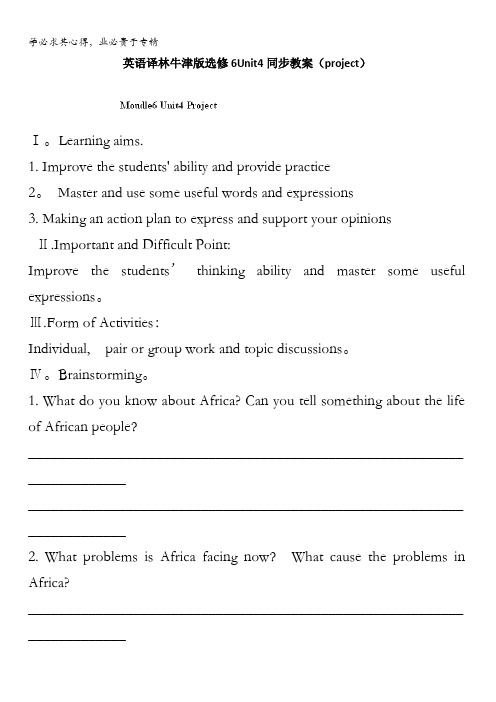
英语译林牛津版选修6Unit4同步教案(project)Ⅰ。
Learning aims.1. Improve the students' ability and provide practice2。
Master and use some useful words and expressions3. Making an action plan to express and support your opinionsⅡ.Important and Difficult Point:Improve the students’ thinking ability and master some useful expressions。
Ⅲ.Form of Activities:Individual, pair or group work and topic discussions。
Ⅳ。
Brainstorming。
1. What do you know about Africa? Can you tell something about the life of African people?__________________________________________________________ _______________________________________________________________________ _____________2. What problems is Africa facing now?What cause the problems in Africa?__________________________________________________________ _______________________________________________________________________ _____________4. Have you ever heard of MSF? What does MSF stand for? What does it mean in English?__________________________________________________________ _______________________________________________________________________ _____________5. Who do you think the members of MSF are? What do you think the members of MSF do?__________________________________________________________ _______________________________________________________________________ _____________Ⅴ.Fast Reading.(Read the text quickly and answer the following questions.1. Why did the MFS nurse go to Africa? ______________________________________________2。
牛津译林版高中英语选修六《Unit1 Project》精品名师课件

3) At the end of the play, Mike said, “No. I
must have forgotten to tell you. ” What does he mean? He wanted to punish them or make fun of them. 4) Is there a bench in the play? No. There isn’t any.
annoying
adj. making you feel annoyed:
It's really annoying when a train is late
and there's no explanation.
He's got a really annoying laugh.
annoy
vt. to make someone angry: Tim really annoyed me in the meeting this morning. I'm sorry. Is my cough annoying you? [+ that] It annoys me that she just expects us to help. It really annoys me when people expect me to tip as well as pay a service charge in a restaurant.
Welcome to our class
Project Putting on a play
Drama
1. What do you know about drama? Drama means a piece of writing to be performed by actors, a play for theatre, television, radio, etc. 2. Have you ever seen dramas either on TV or in a theatre?
牛津译林版高中英语选修六《Unit 1 Laughter is good for you》Project 教案 2
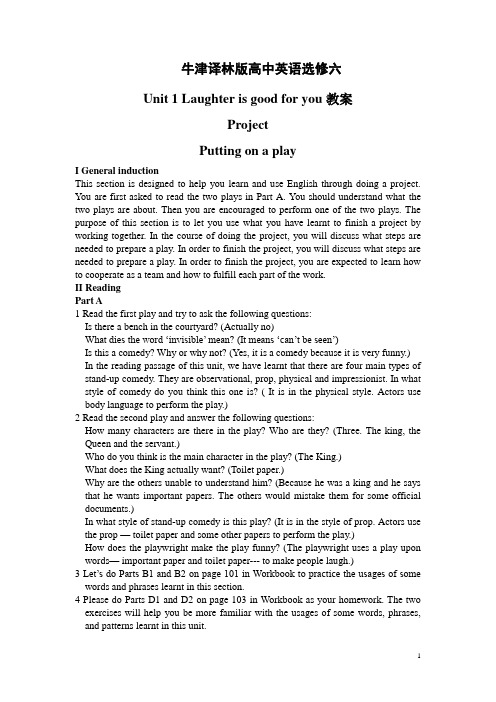
牛津译林版高中英语选修六Unit 1 Laughter is good for you教案ProjectPutting on a playI General inductionThis section is designed to help you learn and use English through doing a project. You are first asked to read the two plays in Part A. You should understand what the two plays are about. Then you are encouraged to perform one of the two plays. The purpose of this section is to let you use what you have learnt to finish a project by working together. In the course of doing the project, you will discuss what steps are needed to prepare a play. In order to finish the project, you will discuss what steps are needed to prepare a play. In order to finish the project, you are expected to learn how to cooperate as a team and how to fulfill each part of the work.II ReadingPart A1 Read the first play and try to ask the following questions:Is there a bench in the courtyard? (Actually no)What dies the word ‘invisible’ mean? (It means ‘can’t be seen’)Is this a comedy? Why or why not? (Yes, it is a comedy because it is very funny.) In the reading passage of this unit, we have learnt that there are four main types of stand-up comedy. They are observational, prop, physical and impressionist. In what style of comedy do you think this one is? ( It is in the physical style. Actors use body language to perform the play.)2 Read the second play and answer the following questions:How many characters are there in the play? Who are they? (Three. The king, the Queen and the servant.)Who do you think is the main character in the play? (The King.)What does the King actually want? (Toilet paper.)Why are the others unable to understand him? (Because he was a king and he says that he wants important papers. The others would mistake them for some official documents.)In what style of stand-up comedy is this play? (It is in the style of prop. Actors use the prop — toilet paper and some other papers to perform the play.)How does the playwright make the play funny? (The playwright uses a play upon words— important paper and toilet paper--- to make people laugh.)3 Let’s do Parts B1 and B2 on page 101 in Workbook to practice the usages of some words and phrases learnt in this section.4 Please do Parts D1 and D2 on page 103 in Workbook as your homework. The two exercises will help you be more familiar with the usages of some words, phrases, and patterns learnt in this unit.Part B1 Now work in groups of four to discuss the eight questions given in this part. While discussing, you should choose one of the two plays to perform. You should also allocate the different tasks among your group members. For example, who will be the actors and actresses? Who will be the director? Who will make the scenery if it is needed? Who will find props? Who will make costumes? You may make a flow chart to help you manage the task.Before perform it, you need to practice a lot.2 Have each group perform the play. After all the groups have performed their plays, have students decide which group’s performance is the best, and who is the best actor or actress in the class. The awards may also go to the best costume, the best director, etc.3 Last, read the article in Part A on page 107 in Workbook, and then write a summary. You may do it as your homework.III PracticeOnce upon a time, there (1)______ a very funny story among three people, the King, the Queen and a servant. One day, as soon as the King entered the palace, he called in a servant and told him he had to have some important papers immediately. Soon came back the servant with a stack of official-looking papers, but (2)______this, the King threw them away at once and shouted: “No, no, no bring my important papers!” The servant dashed out and in a minute re-entered with a newspaper in his hand. This time, to his (3)______, the King tore it into halves and cried: “No, (4)______fool! I must have my important papers RIGHT NOW!!!” However, like the first and second time, the servant failed to bring the King what he wanted several times. Even the Queen didn’t know what her husband wanted and just (5)______ a page from her book and offered it to King. The King moved around in his chair, crossed and (6)_____his legs and seemed very anxious. At last, the servant (7)_______ out a roll of toilet paper. He was puzzled and (8)_______whether the King needed it or not. On the contrary, upon getting it, the King ran out as fast asLanguage points1. I am sitting on an invisible bench, of course. (page 14) 当然,我正坐在一张看不见的椅子上。
牛津译林版高中英语选修六Unit1《Laughterisgoodforyou》Project课件
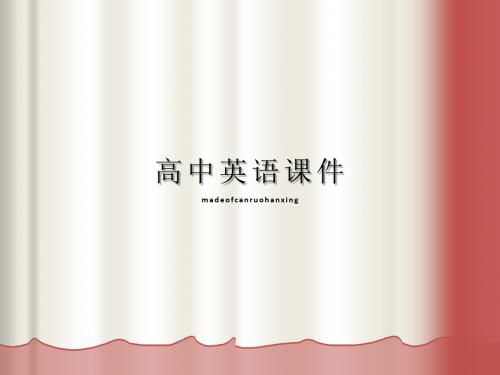
annoying
• adj.makingyoufeelannoyed:
• It'sreallyannoyingwhenatrainislateandt here'snoexplanation. He'sgotareallyannoyinglaugh.
annoy • vt.tomakesomeoneangry:
A.unavoidableB.invisible
C.inaccessibleD.unavailable
2Youshouldjoinus.It’sniceandcosy.(line18)
cosy fortableandpleasant,especially(of
abuilding)becausesmallandwarm
• 2)[beforenoun]describesmoneythatisad dedtoacountry'seconomybyactivitiessu chastheserviceandfinancialindustriesra therthantheproductionofgoodsinfactori es:
• 5)Howdoestheplaywrightmaketheplayf unny? Theplaywrightusesaplayuponwords---importantpaperandtoiletpaper---tomakepeoplelaugh.
Discussion
• Whatdoyouthinkeachplaywantstotellus? PlayI
(6)Followthestagedirections.
PartA Theinvisiblebench
ReadpartAplease,andanswertheques tions:
